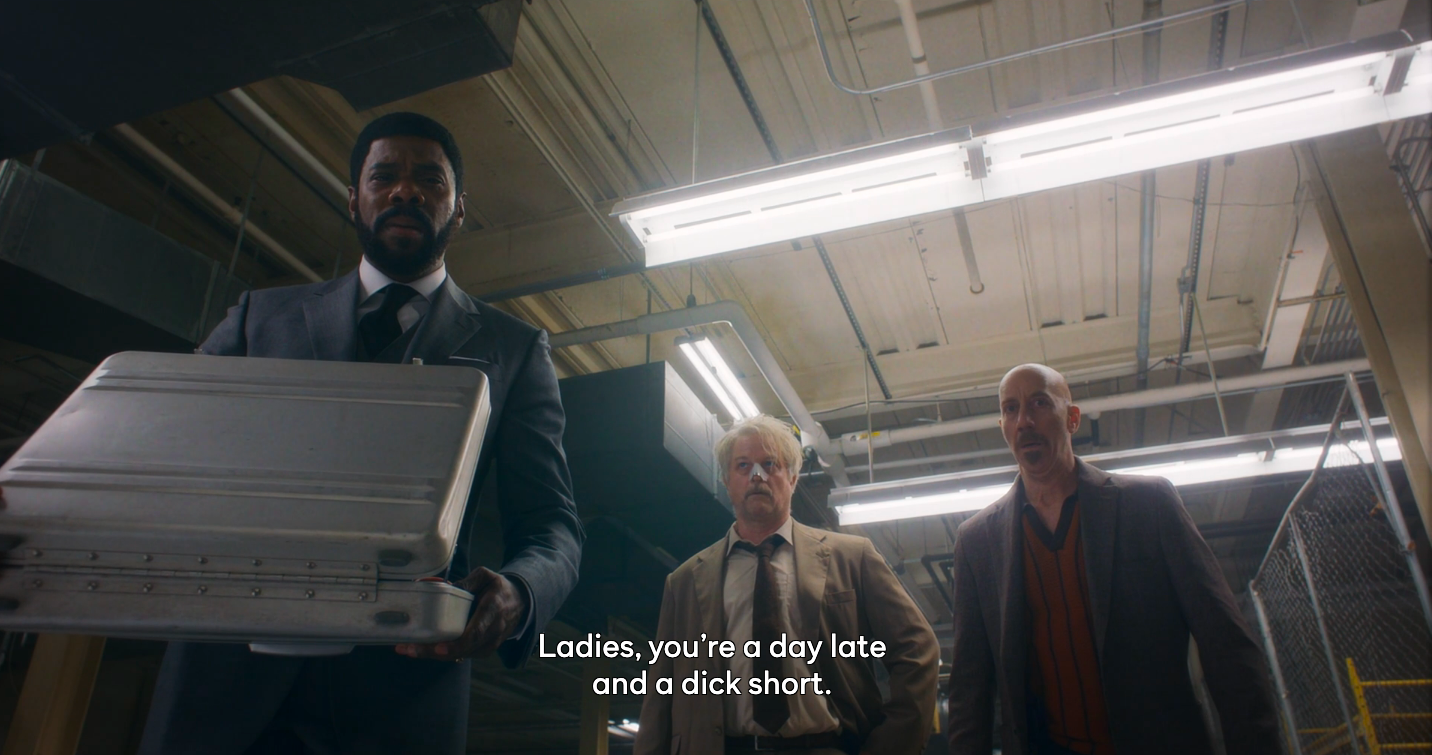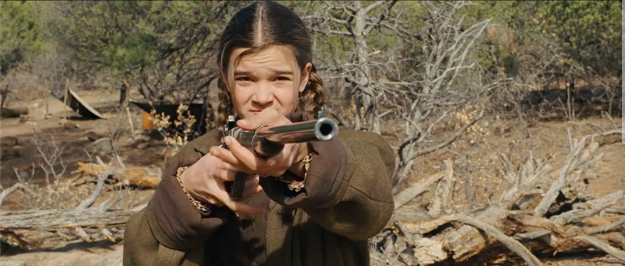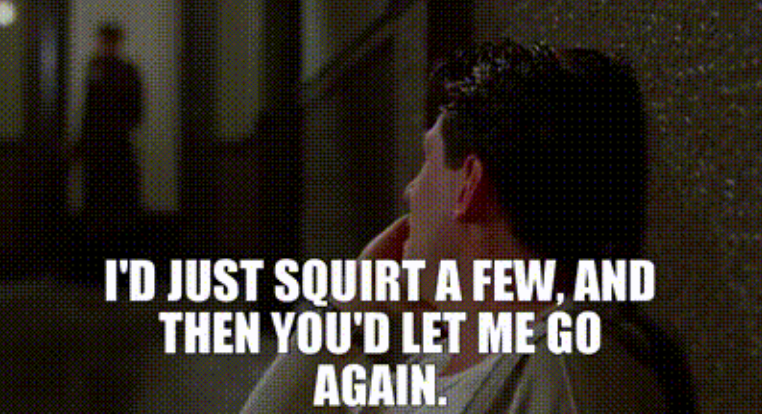Films to Rewatch: The Tragedy of Macbeth, Intolerable Cruelty, Hail, Caesar, The Man Who Wasn’t There
Films to Watch: Barton Fink, The Ladykillers
I have gone on a journey with the Coen Brothers throughout almost my entire life. I was introduced to (some of) their films at a very early (probably too early) age, and I have been watching them ever since. At one point though, I grew rather cold on them. I am not sure exactly, but I consistently found myself feeling “over” them when I attempted to watch anything by them. Then Adam Nayman’s book rekindled my interest in them, and I realized what elements of them I adore and which don’t hit.
14. Drive-Away Dolls [2024]
Ethan Coen’s first solo-feature film was a total dud. It felt like was made by the Fargo television guy instead of one half of the great filmmaking duos in modern United States history. I could go deep into all the ways that it sucked, but that frankly feels undignified and not worth my time. Instead, I settle to just call attention to one tiny aspect early in the film that feels so secondhand-embarrassingly I do not know what even to say. Pedro Pascal has a cameo in this film whose death kicks off the film. How is he killed? In the exact same way he is infamously killed in Game of Thrones. It is such a lowest common denominator joke that I could hardly believe my eyes.
13. The Ballad of Buster Scruggs [2018]
I have to say that while there are moments I enjoyed and a couple of the short stories that worked well enough, this overall felt like a failed exercise. There is something tired by the Coens work before they split up. There is something disconnected from humanity that I find in their later films. The style is unmatched; the productions design, costumes, and everything else is as good as anything. But I do not feel much when I watch them. Their exploration of greed never hits as hard when the characters don’t connect with their films.
12. Raising Arizona [1987]
“It’s just business.”
After the extremely dark debut film, Blood Simple, the Coens tackled similar themes but in a much different manner. They swung to the other end of the pendulum here and frankly made a film that is way too zany. They would spent the majority of the future films operating between these two poles. The big difference being that they always managed to be successful executing brutally dark stories but the more zany their films tended to be the less enjoyable (if not necessarily less interesting) they ended up being. Sure, this film is about greed, the American Dream, and all the jazz the Coens tend to tackle. It just did not hit the way their darker films do.
11. The Hudsucker Proxy [1994]
 I have this thing with the Coens. I feel like they were really great at capturing the spirit of film noirs in this way they never could with straight-up modern screwball comedies. They simply never really make me laugh, and I kind of feel like that is an important element. Hudsucker does at least of course fit within the larger themes the Coens explore. Yea, greed is stupid and the system is a setup to reward stupidity, but rewatching it all these years later I expected to be more impressed after not caring about it too much in college. It seems like a classic film to age better with getting older! It’s as well crafted in many ways as anything, but I simply just do not care about it.
I have this thing with the Coens. I feel like they were really great at capturing the spirit of film noirs in this way they never could with straight-up modern screwball comedies. They simply never really make me laugh, and I kind of feel like that is an important element. Hudsucker does at least of course fit within the larger themes the Coens explore. Yea, greed is stupid and the system is a setup to reward stupidity, but rewatching it all these years later I expected to be more impressed after not caring about it too much in college. It seems like a classic film to age better with getting older! It’s as well crafted in many ways as anything, but I simply just do not care about it.
10. Burn After Reading [2008]
There is a simple and reductive way of thinking about the Coens’ filmography. The films exist on a spectrum that ranges from extremely goofy all the way to deadly serious. Almost all of their films exist somewhere between those two points. With that said though, I find that I have trouble connecting with their films that stray too far into the goofy direction. It is bizarre, because there is a sincerity to those films that I appreciate, and the films never sacrifice substance for the sake of achieving some desired pastiche. The easiest way I can describe it is that their films that seem to be primarily designed to be “funny” in some manner are simply not nearly funny enough. Burn After Reading comes the closest though, and its exploration of greed and the United States fuckery and incompetency frankly appeals to me enough to help compensate for any other deficiencies.
9. True Grit [2010]
“Time just gets away from us.”
If the dominant theme of the Coen Bros. filmography is “greed,” a sub-theme may be selfishness. In a land where individualism has been promoted and valued over all other ideas, suffering and loneliness is sure to follow in needlessly disproportionate numbers. Hailee Steinfeld is desperate for community in her grief. Her father has been murdered. She knows no community exists. She innately understands that she is all on her own and that she has to make her own justice. This is a terrible burden for a fourteen-year-old to have to bear. Yet it is the fate of so many in one form or another. Whose everlasting arms are we to lean on? True Grit fundamentally is about three very different people brought together for selfish desires who learn to benefit from forming community. Sure, there are tangible benefits but emotional benefits as well. The ties that bind us are not chains. (Well, they don’t have to be at least.)
8. Blood Simple [1984]
Okay, this is going to sound really stupid, but it really is quite striking just how good this movie is. These guys had such a clear sense of what they were looking to do here, and the confidence just shines on through. Blood Simple is missing some of the emotional and thematic depth that the Coens were rather quickly able to achieve in their ensuing films. But the technical skills and instincts are there though, and they knew how to make a compelling thriller that exploits their characters’ tendencies for selfishness, greed, and fear.
7. O Brother Where Art Thou [2001]
O Brother Where Art Thou is just at its core a fun, feel-good, episodic adventure film. It’s a great showcase for Clooney’s more comedic version of his star persona (and was a huge breakout film for him in that way). He, Turturro, and Tim Blake Nelson had just tremendous chemistry, and the adventure they go on is a mix of sincere fun along with some icky moments where you can tell the blindspots of the filmmakers. Much like Fargo, the Coens make clear that they do not love the communities they are visiting to put on screen. The Coens are not empathetic artists. They pity people. There is a meanness to their work, but the meanness is the point. The world is cruel, and it is making people selfish and stupid. That view is why their comedies don’t hit as a hard as their darker films, but they are so talented that the Coens pull it off fairly well here.
6. Miller’s Crossing [1990]
Miller’s Crossing is all about cold-blooded greed and warm-blooded love, and how this fucked up land forces you to try to give up the latter because you need to be the former. Gabriel Byrne is caught up in a prohibition era mob war, and he has convinced himself that he needs to be cutting off all emotion in order to operate in this world. He cannot “win” if he does not kill the part of himself that empathizes with and loves other human beings.
It’s all an act though. It’s all a delusion. It’s all a lie Byrne thinks he’s convinced himself of – he is not the stone cold killer (literally and metaphorically) that he pretends to be. By the end of the film though, Byrne has become truly hardened. No tears will get him to back down from what he needs to do to survive. He will kill a friend he knows he cannot trust.
Is this a permanent state though? The final scene calls it into doubt. He has a chance to go back to work for Albert Finney but he says no. Is it because Finney is about to marry the woman Byrne was sleeping with? Is it because he knows Finney’s decision-making is too emotion and calculating enough? The lack of clarity is intriguing.
5. The Big Lebowski [1998]
Something I have been grappling with while going back through the Coens stuff is confronting the fact that I find their films that are more comedy than drama tend to hit less with me. The one exception though was The Big Lebowski. It is an inherently funny movie that does not take itself too seriously, but it recognizes the real stakes of the film just enough to never let it become emotionally detached.
The fact is, as funny as Lebowski is, it is still at its heart a very grim and bleak modern film noir. It is about the American Dream and greed and has an appropriate understanding of how demoralizing it can be to exist in this country – and how easily it can swallow you up. The film is simultaneously silly and ridiculous and with just enough below the surface to keep things interesting. I am probably taking this too seriously at the moment, but it’s where my mind is at after rewatching this film in this point in time.
4. Fargo [1996]
“And for what? A little bit of money. There’s more to life than a little bit of money, don’t you know. Don’t you know that?”
On the Coens spectrum, they probably never managed to the execute the balance between zany comedy and deadly serious drama as well as they did in their instantly iconic film, Fargo. The idea of competing contrasts is actually he major idea of the film. Most of the characters are focused or distracted by the idea of a “better” future instead of being content with the happiness that could be found in their present. The central conflict of the film is primarily caused by Jerry’s financial foolishness (presumably caused by dissatisfaction) – he then makes a dumbass scheme to get money back. His plan is only facilitated by others similarly being blinded by shallow ambition and financial short-cuts. It is the world we live in that this thinking is rewarded by anyone at all.
There is an exception though: Marge Gunderson. She has a simple life. A nice husband. They watch television. He cooks her meals. She punches in and punches out of her cop job. She tries her best at the job, but you do not see her living and dying about it. On some level, she clearly seems to understand it’s just a job and that work/life balance is important.
The key to her character not feeling one-dimensional and bloodless is her mini-story with Mike Yanagita. Mike calls her up on the phone late one night in a rather manic fashion and in so many words asks Marge out on a date. The very married and pregnant Marge then does something out of character (a remarkable statement given that she’s only in the final hour of the movie – but that’s how clearly drawn she is); Marge gets “dolled up” and goes on a date with Mike. She can pretend it’s not a date, but it’s the only time in the film she takes care to make her appearance more obviously (if stereotypically) attractive. It’s an understandable thing. A settled-down person receives attention, and they like receiving that attention. But the moment the date becomes real, the moment Mike sidles up next to her and puts his arm around her, Marge snaps out of it. She can no longer suspend her disbelief. She can no longer delude herself. She is happy with her life; she is at peace with it. And that is where her power comes from. She can see through the bullshit temptation of life and thus she can see through the lies others tell her and themselves.
3. No Country for Old Men [2007]
 “He would never ask for help. Whether or not he needs it.”
“He would never ask for help. Whether or not he needs it.”
The big overarching theme of the Coen Bros. filmography is of course greed in a broken country. When there is a deeply imbedded and under-discussed understanding from everyone in these borders that we are all being pitted against each other to compete for artificially scarce resources, you become driven to do cruel and self-destructive things. That is the story of Josh Brolin’s Llewelyn Moss. He stumbles into a briefcase full of cash. It’s a way out. A way out of the struggle way too many are going through. But nothing can save any of us in this land. A force of nature (Anton Chigurh) is going to mow us all down – especially if we try to escape instead of sticking to the script. We are not special. We will simply get killed off screen.
2. A Serious Man [2009]
“Look, something is very wrong.”
Michael Stuhlbarg is a man who unlike so many others has followed the rules of what he was supposed to do with his life. He got a job. He got married. Had two kids. Got a house. Active in his synagogue. Is that what makes for a good life though?
He has never questioned anything about his life seemingly before. And now it’s all falling apart. He might not get tenure. His kids are beginning to act out. He has been offered a bribe by a student. His brother is jobless, living on his couch, and soon to be arrested. And more importantly, his wife is leaving him for another man.
For a man like Stuhlbarg who never questioned his existence, this is a crisis for which he is completely unprepared for in every way. He does what he was trained to do all his life: desperately try to hang onto the status quo.
Change is an inevitable, certain force of nature. It is coming for everyone. There are no lessons to be learned from it. Some things will work themselves out. Some things will not. Are you ready?
1. Inside Llewyn Davis [2013]
Llewyn Davis is an artist. He is a talented artist. If he wanted, he has the talent to execute soulless dreck that will allow him to lead a financially dignified life in the United States of America. But. Llewyn refuses to sell out and thus becomes a person who refuses to take care of himself financially in this cruel world. This steadfast drive to be a true artist who has high expectations for what he produces drives him insane in some ways; it isolates him from everyone in his life. He may not be selfish financially and “selling out,” but he has failed to establish what seems like true relationships with anyone. You have so much empathy for Llewyn because he is trying to balance with all the demands in his and all of his interactions are corrupted by the financial demands that come from everything this artist is trying to do. It is a sign of the stupidity and moral depravity of the United States that an artist as talented as Llewyn cannot find any tangible success that he so richly deserves.














